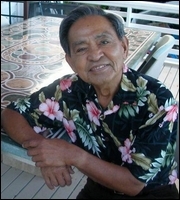Peter Aduja | |
|---|---|
 | |
| Territorial House of Representatives member | |
| In office 1954–1956[1] | |
| District Court Judge | |
| In office 1960–1962[2] | |
| State House of Representatives member, 23rd District[3] | |
| In office 1966–1974[2] | |
| Personal details | |
| Born | Peter Aquino Aduja[4] 19 October 1920[4] Salindig, Vigan, Ilocos Sur, Luzon, Philippine Islands[5] |
| Died | 19 February 2007 (aged 86)[4] Las Vegas, Nevada, U.S.[2] |
| Resting place | Hawaii State Veterans Cemetery[6] |
| Nationality | American |
| Political party | Republican[2][7] |
| Occupation | Soldier, teacher, judge, politician |
| Military service | |
| Allegiance | |
| Branch/service | |
| Years of service | 1944–1946[2] |
| Rank | |
| Unit | 1st Filipino Infantry Regiment[2][8] |
| Battles/wars | World War II |
Peter Aquino Aduja (19 October 1920 – 19 February 2007) was the first Filipino American elected to public office in the United States. He was elected as a representative in the Hawaii Legislature in 1954.[5][9]
Born in the Philippines, Aduja emigrated to Hawaii in his youth, and then served in the United States Army during World War II. After World War II, he worked as a teacher, before becoming one of the first Filipino lawyers in Hawaii. After two years in elected office, he worked for the Hawaiian Department of Attorney General, and served two years as a judge, until being elected to the Hawaii House of Representatives. Aduja died in Las Vegas in 2007.
- ^ Cite error: The named reference
Boylan1991was invoked but never defined (see the help page). - ^ a b c d e f g h "Hawai'i honors Fil-Am legislator". GMA News. 30 March 2007. Retrieved 8 October 2014.
- ^ Clements, John (1972). Taylor's Encyclopedia of Government Officials, Federal and State. Political Research, Incorporated. p. 76.
- ^ a b c "Services set for Thursday for pioneering politician". Star Bulletin. 25 March 2007. Retrieved 11 October 2014.
- ^ a b Borreca, Richard (22 February 2007). "Lawmaker first U.S. Filipino to hold office". Star Bulletin. Honolulu. Retrieved 8 October 2014.
- ^ "Funeral Set Thursday For Former Rep. Peter Aduja". MidWeek. 28 March 2007. Archived from the original on 14 October 2014. Retrieved 12 October 2014.
- ^ Gary G. Aguiar (August 1997). Party Mobilization, Class and Ethnicity: The Case of Hawaii, 1930 to 1964. Universal-Publishers. p. 297. ISBN 978-0-9658564-3-0.
- ^ Revilla, Linda A. (1996). Ikeda, Kiyoshi; Weinstein, Michael G.; Okamura, Jonathan Y. (eds.). ""Pineapples", "Hawayanos," and "Loyal Americans": Local Boys in the First Filipino Infantry Regiment US Army" (PDF). Social Process in Hawaii. 37. Department of Sociology, University of Hawaii at Manoa: 57–73. ISSN 0737-6871. Archived from the original (PDF) on March 4, 2016. Retrieved 12 October 2014. Alt URL
Viotti, Vicki (29 September 2002). "Tale of Filipino bravery about to be told". Honolulu Advertiser. Retrieved 12 October 2014. - ^ Jon Sterngass (1 January 2009). Filipino Americans. Infobase Publishing. p. 128. ISBN 978-1-4381-0711-0.